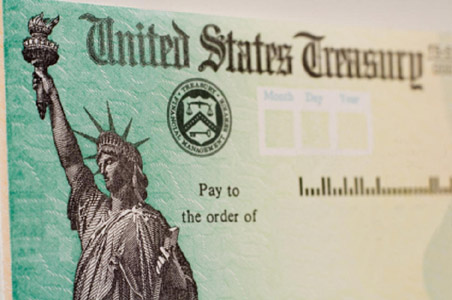
President Biden has signed a third stimulus package into law. Now, $1,400 direct payments will soon be on their way
WASHINGTON (TIP): On Thursday, March 11, a few hours before he was to speak to the nation on the first year of COVID-19, President Joe Biden signed the American Rescue Plan — a $1.9 trillion stimulus package — into law.
That means a third round of direct cash payments will soon be on the way, but there are a few differences from the stimulus bill Congress passed in December.
Specifically, this round of payments will be quite a bit larger for most of those who received checks previously. Instead of the $600 that was sent out in December, individuals will receive as much as $1,400, depending on their income. However, the income threshold to receive a check will also be stricter this time around, after moderate Senate Democrats used their leverage to negotiate a lower maximum eligible income with the Biden White House.
Those changes mean that about 17 million fewer people will receive a third round of stimulus payments than would have under the House-passed version of the bill, according to the Institute on Taxation and Economic Policy, but some 280 million people will still be eligible.
Here’s what you need to know:
Who qualifies for a $1,400 direct payment?
Unlike previous rounds of payments, eligibility for the new $1,400 checks may be determined based on either 2019 or 2020 tax returns, depending on whether you’ve filed yet for 2020 — and whether the IRS has processed your return. In general, the federal government will use the most recent income information it has on file to determine eligibility.
Here’s who’s eligible for a payment:
Adults who earned $75,000 or less in their most recent tax year will receive the full $1,400, as will married couples who earned $150,000 or less, and heads of household who earned $112,500 or less.
Adults who earned more than $75,000, but less than $80,000; married couples who earned more than $150,000, but less than $160,000; and heads of household who earned more than $112,500, but less than $120,000, will be eligible for a reduced payment.
Online calculators can give you an idea of how much to expect, based on variables like your filing status and number of dependents. The White House on Thursday also rolled out a website dedicated to helping you understand what’s in the bill — including information about the direct payments.
Adults who earned more than $80,000, married couples who earned more than $160,000, and heads of household who earned more than $120,000 will not be eligible for checks.
Parents will also receive an additional $1,400 check for each dependent claimed on their tax returns. Unlike with previous direct payments, all dependents — including college students and some people with disabilities, not just children under 17 — will be eligible.
Undocumented immigrants are not eligible to receive direct payments. Households in which one adult has legal residency and the other does not would be eligible for at least one check, however.
If you didn’t file a tax return in 2019 and haven’t yet done so in 2020, you may be able to use the IRS’s free file fillable form to do so in order to receive a stimulus check.
When will I receive a direct payment?
White House press secretary Jen Psaki said Thursday after the signing that some checks will start being deposited in bank accounts as soon as this weekend. Others may take longer, depending on a few factors.
As was the case with the last two stimulus checks, direct-deposit recipients are likely to get their checks the fastest. As CNET notes, direct deposit payments began registering in accounts about two weeks after the last stimulus package was passed. But per Psaki, it could be even faster this time around.
Physical checks are expected to take about a week longer than direct deposits, and should begin to go out starting March 29 or so.
Economic impact payment, or EIP, cards could take the longest. The prepaid debit cards may begin to go out the week of April 5, depending on when the stimulus package is signed into law.
Is there anything I need to do to get a check?
As Vox’s Fabiola Cineas and Ella Nilsen explained after Congress passed its previous round of direct payments, most people don’t need to do anything to get a stimulus check. If you filed taxes in 2019 or 2020, meet the eligibility requirements, and included your direct deposit information, the payment should show up in your account in the coming weeks.
If your direct deposit information isn’t on file with the IRS yet, you can still provide those details using IRS’s “Get My Payment” tool before the latest wave of payments starts going out.
(Source: Vox)




Be the first to comment